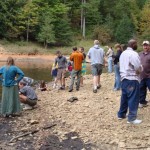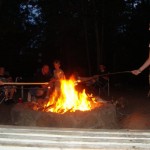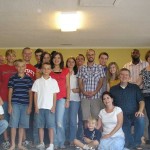Greetings?
Have you ever paid attention to Romans 16? Twelve times, Paul commands his readers to “Greet” someone or a group of people.
Who did Paul intend to do the “greeting”? What did it mean for them to “greet” others? Who were they “greeting”?
I think, if we examine this passage (and other similar passages) closely, and we identify who Paul was talking to, who he was talking about, and what he intended them to do, then we would recognize how far we’ve come from the interactive and interrelational attitude of those early churches.
Today, we don’t even know one another… how could we possibly greet people who do not meet with us?
Count others more significant than yourselves
At the beginning of Philippians chapter 2, Paul lays out a very convicting list that should define the life of believers. One of those characteristics is this: “Count others more significant than yourselves” (Philippians 2:3) Another is this: “Let each of you look not only to his own interests, but also to the interests of others” (Philippians 2:4).
Paul then tells us that in order to think like this, we should think the same way that Jesus Christ thought (Philippians 2:5-11).
Have you ever thought about what this should look like in the lives of Christian leaders, elders, pastors, bishops, etc? Do these commands apply to leaders in the church? How?
A Family Affair
Elroy at “A Change Room” wrote a great post called “A (not-so-secret) Secret to Great Church Life.” In his post, Elroy reminds us that the church is a family. Here are some “family values” that he says applies to the church:
Families Genuinely Take Care of One Another.
Families Spend Time Together.
Families Grow.
Families Share Responsibility.
This is his conclusion:
The language of the New Testament treats us to the imagery of the church as a family, not a business. Don’t think the writers of the New Testament were not privy to corporation-like information. Their previous religious experiences alone would’ve been enough to arm them with business-like thinking. The state-political environment of their day was another great example of man-made super corporate structures. But instead we find locked up in their pursuit for spiritual family the value system that motivated the Triune God to create humans in the first place. According to Their eternal purpose They created a community similar to Themselves. Because we are made in the likeness and image of God, we are only truly human when we are living in community. Surely this must be significant?
Elroy is right. Those first Christians knew all about hierarchy and organization and even corporate structures. But, instead of employing that type of language, they referred to the church as family. And, yes, Elroy, I think this is very significant.
Campfire Fellowship
Jon at “Jon’s Journey” wrote a great post last week called “Fellowship.” After defining fellowship/communion, Jon wrote:
This summer I’ve enjoyed some great fellowship around campfires, on friends decks, around dinner tables, and in living rooms. I’ve had some brief fellowship on Sunday mornings before and after the service. But I think the campfires were the best though.
I like Jon’s statement. First, he doesn’t discount the fellowship that he has with other before and after “church services.” But, he recognizes that he can also have fellowship (and at times, deeper fellowship) at other times.
By the way, I like campfire fellowship too. I also like coffee shop fellowship, and fellowship in homes and parks. In fact, the way our meeting is set up, we have great fellowship when we meet together as the church.
Where do you like to fellowship with other brothers and sisters in Christ?
Missing the Target
Our target is to be like Christ. Right? That’s what Paul says:
…until we all attain to the unity of the faith and of the knowledge of the Son of God, to mature manhood, to the measure of the stature of the fullness of Christ… (Ephesians 4:13 ESV)
Imagine that all of your beliefs, traditions, practices, everything were rolled up into one score and placed on a target (like a dart board) in relation to your distance and direction from being “like Christ.” Obviously, no one would hit the bulls eye.
Now, imagine that other people’s “mark” were placed on the target (like other darts on the dart board) in relation to their distance and direction from being “like Christ.”
Would we be more comfortable with those who scored closer to us, or to those who scored closer to being “like Christ” but on the other side of the target from us?
If we can figure out why most are more comfortable with others who are closer to them instead of others who are closer to Christ, we may understand why we don’t live in and demonstrate the unity that we have in Christ.
What do you think?
Sincere love makes the greatest difference
My friend Danny (from “learning…“) met with us for just over a year. Then, a couple of weeks ago, he moved to Williamsburg, VA. In his post, “A Wonderful Body of Believers,” he talks about the time that he spent with us. I can’t think of a better compliment that what Danny says:
During my time at SEBTS there have been many who have befriended me over the years and blessed me in some way. As an encouragement to you I would like to share about some of them and what they did for me . These people did things that are not in some method book for discipleship, community, fellowship, or teaching. They were just simply being themselves in the Lord and reached out to me for the bottom of their heart through the gifts the Holy Spirit has given them and used the World’s Goods that God gave them. It is this sincere love for God and people that makes the greatest difference. It is when they were like Christ to me that they ministered the most to me.
Here is a picture of many of the people who gather as Messiah Baptist Church. They have reached out to me as a brother and a son, taken me into their homes, fed me, encouraged me, fixed my car, helped me move, talked about (walked with) Jesus and the Bible, talked philosophy, showed me how to love others, even let me use my gifts in the Lord to encourage, teach and comfort them, and much much more. With out neglecting structure at the proper times all this was mostly spontaneous.
I would like to say more but our (and “Messiah Baptist’sâ€) real boast is in the Lord, Jesus Christ. It is he that began a good work in us and will complete it. It is he that is working though us to love, to teach, to understand, to spread the good news and build the Kingdom of God: His kingdom.
I pray that we will treat everyone that God brings into our lives that way that Danny felt we treated him… to God’s glory and for the advancement of his Kingdom! I can also tell you that Danny was a huge encouragement to all of us!
By the way, Danny includes a picture of some of the people that we meet with in his blog post.
Getting Ready for a Birthday Party
As I mentioned in a few of my Ethiopia itinerary posts, I missed my daughter’s, Miranda’s, birthday because it was my last day in Ethiopia. (I drank a soft drink called Mirinda in her honor that day.)
Miranda and her friend Lindsay decided to have a joint birthday party between their two birthdays to celebrate. That joint birthday party is today, and I’m certainly NOT going to miss THIS!
They have a big day planned. They’ve invited over forty of their friends. They’ve asked some people to plan some games for everyone. Everyone will eat pizza and cupcakes. Then, when it gets dark, we’re all going to watch a movie outside using a projector that they’ve borrowed.
Yesterday, while we were getting ready for the party, we had to test the cupcakes and the projector outside. It was so much fun hanging out with our friends and getting ready for the party. It was almost a party getting ready for the party!
Anyway, I wish we could invite all of you to join us today. I think it will be a great day to celebrate these two young ladies.
Why is one covenant not enough?
According to Jesus, all of those who belong to God are now covenanted with God. For example, Jesus said that his blood represents this new covenant:
And he took a cup, and when he had given thanks he gave it to them, saying, “Drink of it, all of you, for this is my blood of the covenant, which is poured out for many for the forgiveness of sins.” (Matthew 26:27-28 ESV)
In the same way, Paul recognized that he currently served people who were under a new covenant with God:
Not that we are sufficient in ourselves to claim anything as coming from us, but our sufficiency is from God, who has made us competent to be ministers of a new covenant, not of the letter but of the Spirit. For the letter kills, but the Spirit gives life. (2 Corinthians 3:5-6 ESV)
Finally, the author of the book of Hebrews explains how Jesus (as our high priest) is a better mediator of this new covenant:
This makes Jesus the guarantor of a better covenant. (Hebrews 7:22 ESV)
So, all of those who are in Christ – who have been saved by the blood of Jesus Christ – are covenanted together with God… not based on their (our) ability to keep a covenant, but based on God’s promises (for example, see Hebrews 10:23).
We are in a covenant with God, and are therefore covenanted together with one another. Our covenant with God includes new familial relationships with others who are covenanted with God. Just as God is our father, his children (and all of his children) are our brothers and sisters. Our familial responsibilities toward one another are included in our relationship with God.
Thus, I cannot choose how I should treat someone who is in Christ. That relationship and those responsibilities are already ours because of our joint relationship with God.
So, the question that I’ve been struggling and wrestling with is this: If we are already covenanted with God and if we are already brothers and sisters with one another, then why do we need a separate “church covenant”?
A “church covenant” can only do two things: 1) It can remind of us our relationships and responsibilities which already exist, whether we have a covenant or not. And 2) it can specify with whom we share those relationships and responsibilities.
If we are relying on a “church covenant” for reason #1 above, then the “church covenant” is nothing more than a reminder of the new covenant in Christ. We are already covenanted with God through Christ, and therefore covenanted with all other people who are part of the same covenant. Thus, this is really not a “church covenant” but the new covenant.
The problem with #2 above is that our relationships and responsibilities extend to all brothers and sisters in Christ that God brings into our lives. If we use a “church covenant” to include some believers and exclude others, then we are dividing the body of Christ and making distinctions that only God can make. We are trying to choose who to love and who to serve. (Of course, this makes life much easier, but it doesn’t make it a life that lived according to the gospel.)
So, why do we need a “church covenant”? Why is one covenant (the new covenant in Christ) not enough?
Building Relationships – Ethiopia Report 5
So, we went to Ethiopia to teach church leaders, to teach prisoners, to teach villagers, to teach teenagers… No. Not really. Those are some of the things that we did while we were in Ethiopia.
 We went to Ethiopia to build relationships. We went to Ethiopia so that we could get to know our brothers and sisters better. In the process, we taught. We also learned. And, for a short time, we shared our lives with one another.
We went to Ethiopia to build relationships. We went to Ethiopia so that we could get to know our brothers and sisters better. In the process, we taught. We also learned. And, for a short time, we shared our lives with one another.
We walked together and worked together. We ate injera and wat together and we drank buna (coffee) and chai (tea) together. We shared a bowl of fandisha (popcorn). We sat together and talked about their church and our church, their struggles and our struggles. We talked about evangelism and discipleship and Scripture and missions.
Where we agreed, we encouraged and strengthened one another. Where we disagreed, we loved and accepted one another. We worked together in Christ, not in ourselves and our ability to agree with one another.
 It’s true that we probably saw the best of their culture. We did not have to work for a living while we were there. We did not have to worry about where our next meal would come from. We did not have to be concerned about being beaten by our neighbors for proclaiming Christ.
It’s true that we probably saw the best of their culture. We did not have to work for a living while we were there. We did not have to worry about where our next meal would come from. We did not have to be concerned about being beaten by our neighbors for proclaiming Christ.
They showed us their best by serving us and showing us hospitality. In the process, we grew to know and love one another. Connections were made that will remain forever, whether or not we see each other again on this old world.
However, those relationships that were built also strengthen the resolve to see and work with one another again. I now know some people who live in Alaba, Ethiopia. Already, I wonder how they are doing. I wonder what is going on in their lives. I wonder what Nigussie is planning. I wonder what Martha is cooking. I wonder how Rani is doing in school.
 Because of our personal relationships with them, we’ve also begun to connect the church in Alaba, Ethiopia to our church here in North Carolina. We know the people that we’re praying for. When they need help, we know their names and faces and cares and struggles.
Because of our personal relationships with them, we’ve also begun to connect the church in Alaba, Ethiopia to our church here in North Carolina. We know the people that we’re praying for. When they need help, we know their names and faces and cares and struggles.
For Danny and me, our number one complaint was that we could not communicate better. We wish that we knew Amharic better or that they knew English together. So, we spend alot of time learning each other’s language. When (If God wills) we go back to Alaba, Ethiopia, it will be that much easier to communicate and get to know one another even better.
We learned that we all had needs and desires. We learned that we all had strengths and weaknesses. We learned that we could learn from one another. And, together, we were able to encourage one another to trust God.
 People are important. The people who are part of our church in North Carolina are important. The people who are part of the church in Alaba, Ethiopia are important. The people who live and work and shop next to me are important. God cares about them all.
People are important. The people who are part of our church in North Carolina are important. The people who are part of the church in Alaba, Ethiopia are important. The people who live and work and shop next to me are important. God cares about them all.
On this trip, God helped me understand a little better about how much he cares for people, and how important it is for me to build relationships with people – especially people who are different than me.
Southern Maine Update
My friend Dan from Canada… I mean Maine… (at “The Ekklesia in Southern Maine“) was very nice to continually remind everyone to pray for Danny and me while we were in Ethiopia. If you remember (see my post “Looking for Ekklesia in Southern Maine“), Dan and his wife Stephanie has been seeking Christian fellowship in the Portland, Maine area.
Now, according to Dan’s update, it seems that God is bringing people into their lives. See Dan’s post “Weekly Update: 07.25.10.” In the midst of thunderstorms and other struggles, Dan and Stephanie are meeting other Christians. And, he says that they are learning that all of life (including thunderstorms) impacts our fellowship with other brothers and sisters in Christ.
By the way, Dan was quite the blogger while I was gone. If you haven’t read them yet, check out these posts:
Keep blogging, Dan!










